Mari Belajar Lagi.....
A short description of the commonly used coin grades.
A short description of the commonly used coin grades.
Fleur de Coin (FDC)
A perfect or virtually perfect coin. Fully struck up. No Contact- or other Detracting Marks visible with the naked eye, and only minute superficial imperfections, relating to the manufacturing process rather than any other cause, may be visible under magnification. Fully Lustre or Mint Bloom is present. Toning on Silver coins (if present) must be attractive. Brilliance (Color) on Bronze Coins should be 90% plus. Eye Appeal is outstanding. To reiterate, it is a completely flawless mint state coin with nothing forgiven. This grade is very rare, not to be taken lightly or accepted easily.
Perfect Mint State (MS-70)
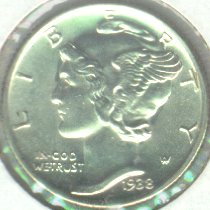 It is a theoretical perfection. To achieve such a grade, the planchet will have to have been perfectly formed, and have flawless, lint-free surfaces. The dies will have to have been in new condition and raised from unworn masters, and the dies will have had no lint, dust, oil or other contaminants on their surfaces. The coining press will have been perfectly adjusted to give a full strike to the coin, which will then have received no marks upon being ejected from the press, nor in its slide down the chutes and sorting tables/grids and into a receiving bin. Nor will it have been marred by all the other coins following it into the bin, nor from the dumping and counting into bags for distribution. Such a coin is not possible. We are dealing here with an automated process that manufactures "Business Strikes" intended for daily commerce.
It is a theoretical perfection. To achieve such a grade, the planchet will have to have been perfectly formed, and have flawless, lint-free surfaces. The dies will have to have been in new condition and raised from unworn masters, and the dies will have had no lint, dust, oil or other contaminants on their surfaces. The coining press will have been perfectly adjusted to give a full strike to the coin, which will then have received no marks upon being ejected from the press, nor in its slide down the chutes and sorting tables/grids and into a receiving bin. Nor will it have been marred by all the other coins following it into the bin, nor from the dumping and counting into bags for distribution. Such a coin is not possible. We are dealing here with an automated process that manufactures "Business Strikes" intended for daily commerce.Specimen Proof (SP-70 or PF-70)
Although very rarely seen, these are attainable grades, since Specimens and Proofs are generally double struck on specially prepared, polished blanks using specially prepared dies on a slow, high pressure press, and the pieces are immediately hand picked off the press with gloved hands and carefully placed in protective holders.
Superb Mint (MS-67)
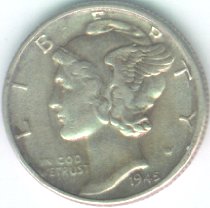 Pieces of this quality will immediately catch the experienced eye and will appear as perfect coins to most other graders. They are distinguished by their full (or very nearly full) strike, superb, virtually flawless surfaces and superb luster. If there are any shortcomings or detractions, they are not initially obvious, but will be discovered only after extensive study under magnification. These are exceptional pieces, rarely seen.
Pieces of this quality will immediately catch the experienced eye and will appear as perfect coins to most other graders. They are distinguished by their full (or very nearly full) strike, superb, virtually flawless surfaces and superb luster. If there are any shortcomings or detractions, they are not initially obvious, but will be discovered only after extensive study under magnification. These are exceptional pieces, rarely seen.Gem Mint State (MS-65)
There is a definite look of quality to an MS-65 coin that easily distinguishes it from lower grades of Mint State. On initial examination, with the naked eye, the piece will appear nearly perfect. A more detailed examination will uncover minor flaws. The strike will be at least typical for the series, if not better. The surfaces will have only slight marks that will not distract from the overall appeal of the coin, and the luster will usually be better than that typically seen on Mint State coins of its type. Quite often, one of these factors will be well above the required level and will compensate for another factor which is a bit below standard. Virtually flawless surfaces may, for example make up for subdued luster or a slightly weak strike.
Choice Mint (MS-63)
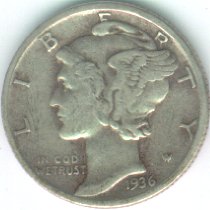 Generally speaking, this can be thought of as a nice example of Mint State coin which does not meet the strict quality requirements of an MS-65. An MS-63 coin will be an attractive and quite typical example of a new coin of its type with a strike that is typical for the series. There will be a number of surface marks, but not too many, too large nor too awkwardly placed so as to be a distraction. And, while the luster is usually attractive, it may be somewhat subdued or there may be some dull areas. Frequently, an MS-63 coin is an MS-65 coin that has a slight "problem" such as "one hit too many". Also very often, one grading factor will be of a high quality not normally seen at this grade and will compensate for a weaker factor, such as superb luster balancing a weak strike, or near flawless surfaces outweighing diminished luster.
Generally speaking, this can be thought of as a nice example of Mint State coin which does not meet the strict quality requirements of an MS-65. An MS-63 coin will be an attractive and quite typical example of a new coin of its type with a strike that is typical for the series. There will be a number of surface marks, but not too many, too large nor too awkwardly placed so as to be a distraction. And, while the luster is usually attractive, it may be somewhat subdued or there may be some dull areas. Frequently, an MS-63 coin is an MS-65 coin that has a slight "problem" such as "one hit too many". Also very often, one grading factor will be of a high quality not normally seen at this grade and will compensate for a weaker factor, such as superb luster balancing a weak strike, or near flawless surfaces outweighing diminished luster.Typical Mint State (MS-60)
The surfaces of an MS-60 coin will often have what is typically described as a "baggy" look, with a numerous "bag marks" or "hits" of varying sizes depending on the softness of the coin's metal. And, while it is usual to expect an MS-60 to look a bit beat-up, if any of the hits are unusually large or deep, they need to be described separately. The strike may be soft or weak in one or more areas, and the luster may be impaired by a dullness from over dipping and be much less than expected on a new coin of its type. There is, however, no wear on the surfaces of the coin.
Very Choice / About Uncirculated (AU-58)
 There are only the slightest traces of wear visible on the highest points of the coin, frequently, they are little more than luster breaks. A light halo of hair lining might be visible as the coin is rotated in the light, and there may be a few rubs in the larger fields.
There are only the slightest traces of wear visible on the highest points of the coin, frequently, they are little more than luster breaks. A light halo of hair lining might be visible as the coin is rotated in the light, and there may be a few rubs in the larger fields.Choice / About Uncirculated (AU-55)
There are only small traces of wear visible on the highest points of the coin. Wear often occurs in different spots on different designs, and the larger fields will show some surface disruptions, however much of the original luster is intact.
About Uncirculated (AU-50)
There are traces of wear on most of the higher areas of the designs and considerable disruption is seen in the larger fields. At least half of the original mint luster is present.
Choice / Extremely Fine (EF-45)
There is a very light overall wear on the coin's higher points, though all of the design details are very sharp. Mint luster is still prominent on many areas of the coin's surface, though mainly in protected areas.
Extremely Fine (EF-40 or XF-40)
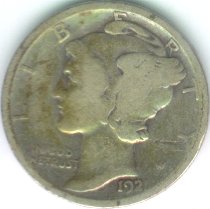 There is light wear on the high points of the designs, but there is still an excellent overall sharpness. Considerable mint luster will still show in the protected areas. In general, a coin in "Extremely Fine" condition includes a wide range of quality. This ranges from coins with some lustre to those with no lustre, and some wear on the fine details. In general, an XF coin has a full and complete design which on close examination exhibits minimal wear on the detail and can be completely devoid of lustre.
There is light wear on the high points of the designs, but there is still an excellent overall sharpness. Considerable mint luster will still show in the protected areas. In general, a coin in "Extremely Fine" condition includes a wide range of quality. This ranges from coins with some lustre to those with no lustre, and some wear on the fine details. In general, an XF coin has a full and complete design which on close examination exhibits minimal wear on the detail and can be completely devoid of lustre.Very Fine Plus (VF-30)
There is a light even wear on all but the most protected surfaces, and the details on the high points are worn, though there is still some sharpness to the major design features and lettering. Traces of original mint luster remain in the most protected areas.
Very Fine (VF-20)
There is moderate wear on all of the high parts of the coin and the designs and lettering have lost much of their sharpness. The original mint luster is virtually gone. A coin in "Very Fine" condition should have a full inscription, and all devices will be only moderately worn. It will usually have the most wear on the high points - hairlines, cheekbones, dress folds, and headgear (if present). Major parts of the design are clear, but minor details are weak. These coins are well circulated, with many coins fitting into this grade.
Fine (F-12)
There is moderate to considerable even wear and although the original designs are recognizable and all lettering visible, they have some weaknesses and lack details. A coin in "Fine" condition has seen a great deal of circulation. The coin should have a full or almost full inscription, while some letters may be weak. Hairlines and other smaller details, such as headgear, dress folds, and facial features, will show significant flatness, although the major devices on the coin will be fully outlined.
Very Good (VG-8)
This is a well worn piece with most of the larger details of the designs being worn nearly smooth. A coin in "Very Good" condition is not very good at all. The small details are all gone, as well as most of the large details. The portrait of figures is outlined, and has some relief, but often, a good deal of the legend is worn away. Coins of this grade quite often have scratches, bumps, and other disfigurements.
Good (G-4)
This is a heavily worn piece with all major designs visible, though in little more than outline shapes with very little central detail. There may be faintness in some areas, but most lettering should be readable.
About Good (AG-3)
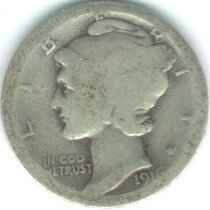 This is a very heavily worn coin with portions of the lettering, date and legends being worn smooth and the date may be barely readable.
This is a very heavily worn coin with portions of the lettering, date and legends being worn smooth and the date may be barely readable.Fair / Poor
A coin in either "Fair" or "Poor" condition is basically just a slick round piece of metal with a faint outline of some shape which might be a nose, ear, or maybe just a ding in the metal.
Split Grades
When there are significant differences between the obverse and reverse sides, a split grade may be assigned. Split grades are denoted with a "/". For example, "F/VF" means that the obverse is F and the reverse is VF. The overall grade is often determined by the obverse. However, an intermediate value may be appropriate when the difference between the obverse & reverse is significant, especially if the reverse is lower. A coin graded MS-60/61 would be considered to have an overall grade of MS-60, and another at MS-65/63 could be considered to have an overall grade of MS-63.
Net Grades
Net grading is a term used when referring to coins that have problems. For example, a coin might have XF wear, but have been scratched, corroded, cleaned, etc. Often, such a coin will be given a "net" grade, say VF reflecting the undesirable issues. This is meant to reflect that while the coin may technically grade XF, the market value should be somewhere close to that of an average VF coin. While completely problem free coins are the exception, net grading is probably applied to less than a fourth of the coins out there
Grading standards (by country)






No comments:
Post a Comment